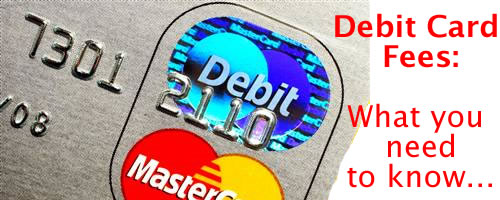
New Rules on Debit Card Fees
Overdrafts fees once provided a major source of revenue for banks. No longer, under new Federal Reserve regulations effective August 15, 2010 for all debit cards. Prior to this rules change, banks typically collected between $10 to $38 per overdraft, according to a Federal Deposit Insurance Corp. (FDIC) study.
In short, they earned millions of dollars from consumers who failed to keep a positive balance on their cards. Now, banks cannot charge you any fee if you exceed the balance on your debit card unless you opt-in to allow overdrafts.
What this means in practical terms is that instead of your transaction going through at the point of sale, and then finding out later that your card is overdrawn, your transaction will simply be rejected for insufficient funds. Or if the transaction goes through because your balance is not verified in real time, the bank can only alert you about your overdraft status but cannot charge you a fee.
Of course, you are still obligated to cover any overdrafts. Bear in mind you can be charged a fee if you opt in to overdraft protection. You may pay an annual fee for this service or if you have a debit card tied to a checking and savings account, many banks will transfer funds out of savings to cover checking account overdrafts.
Prepaid debit cards, in contrast, for the most part seldom allow for overdrafts; if you have insufficient funds on your prepaid card, your transactions simply will not go through. Credit card overdraft fees are not addressed by the new rules.
Prepaid Debit Card Fees
By their very nature as an alternative to credit cards and traditional debit card, prepaid cards come with fees. These fees vary from card program to card program, so it pays to understand how they differ. In a nutshell, charging fees is how the prepaid card companies earn any revenue and stay in business. You should expect the fees you pay to be reasonable. Typical fees include:
- One Time Activation Fee ($9.95 on average)
- Monthly Fee (i.e. $4)
- ATM Withdrawals (i.e. $2.50)
- Signature transactions
- PIN transactions
- Calls to phone support
- Replacement card fee
Some cards offer a flat monthly rate instead of a per transaction fee. Depending on how many transactions a month you make, paying a flat fee could save you money. Also, keeping a higher balance on your card could entitle you to lower fees.
TIPS ON DEBIT CARD FEES: Instead of withdrawing cash at an ATM, you can get extra cash back when you make a PIN transaction. For example if you buy something at the grocery story for $40, you can get another $40 as cash back and avoid the likely more expensive ATM fee. Check your transaction history or balance online rather than calling phone support. Also, sometimes you can get a bonus reward for setting up direct deposit to a card account.
Debit cards can save you money compared to alternatives such as check cashing fees and wire transfers. When shopping for a card, be sure to check the card’s fee table, which may be under a section such as About the Card, or FAQs.